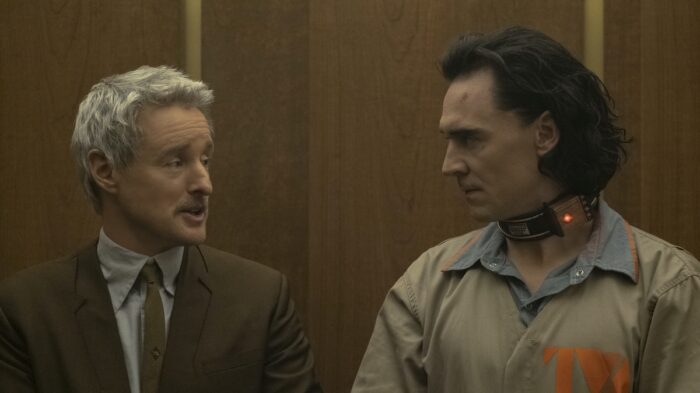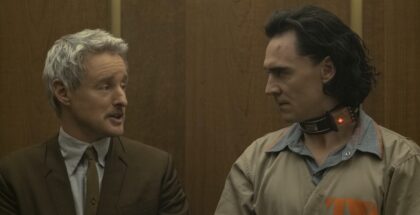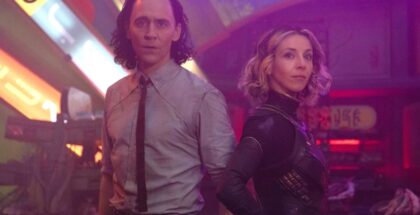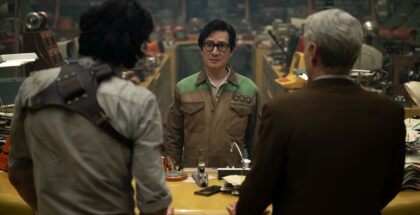Why you should catch up with Loki
Review Overview
Visuals
8Cast
8Pace
8David Farnor | On 10, Jun 2021
Season 2 premieres on 6th October 2023. This spoiler-free review is based on the opening episodes of Season 1. Already seen it? Read our spoiler-filled review here.
“Why would someone with so much range just want to rule?” asks Agent Mobius (Owen Wilson) early on in Loki, the solo Disney+ outing for Marvel’s trickster.
Loki the character has always been someone with an appetite for power, and Tom Hiddleston has always played him with a hint that the size of his ambition is compensating for something. Because if the MCU has taught us one thing about Loki, it’s not that he’s an all-powerful villain, but that he’s a perennial loser – he’s the god of mischief, not of menace, and that makes him more interesting than an out-and-out bad guy.
That also means that as the MCU has expanded on the big screen, Loki has lost the threatening streak that made him exhilarating as well as likeable – his arc of increasingly finding a conscience was sweet to watch but didn’t leave many places left for Loki to go beyond that point. Loki the TV series’ great achievement is finding the way to get the best of both worlds, giving Tom Huddleston more time to explore Loki’s range – and us a chance to see even more sides of the trickster, from sympathetic outsider to, yes, cunning double-crosser.
The show’s first inspired move is to start at the moment in Avengers: Endgame when the Avengers travel back to 2012 – and past Loki finds himself with a chance to escape with the Tesseract. By diverging from the franchise’s timeline, the series gives Loki a loophole within which to cause mayhem with that old glint back in his eye, while not disrupting the overall continuity of the MCU.
That’s where the second inspired move comes into play – past Loki’s attempts to play with his fate attract the attention of the Time Variance Authority (TVA for short), whose job is to keep the “sacred timeline” intact, thus avoiding pandemonium and possibly the end of the universe, not to mention the end of several other universes. Before you can say “multiverse” or “Doctor Strange”, we’re moving at pace through this uncharted part of the MCU, and the opening two episodes do a great job of filling in the blanks without getting bogged down by exposition.
That’s partly thanks to the scripts by the writing team – led by head writer Michael Waldron – which slip exposition into each exchange with the lightest and quickest of touches. The Infinity Stones? Dismissed in the face of this show’s wider scope. Why we haven’t heard of the TVA before? Perhaps because everything we’ve seen in the MCU was meant to happen. The only question the series doesn’t have an answer for is “What’s a fish?” – one of the programme’s many inspired passing gags.
It’s also thanks to some slick visual storytelling. There’s more than a touch of Douglas Adams to the mix of sci-fi, absurdity and bureaucracy, and director Kate Herron delivers a masterclass in world-building from the very opening frame. Herron, who swiftly crafted vivid snapshots of communities in BBC Three’s Five by Five and helped create Sex Education’s unique transatlantic vibe, is confidently at home with the material, fusing Brazil and Mindhunter together to create a retro-futuristic mix of brutalism, 70s-yellow lighting and whirring machinery.
A Public Information-style cartoon that explains the TVA recalls Jurassic Park’s playful sense of humour, while a walking, talking holographic clock sits somewhere between Star Wars and Diddy Kong Racing. It’s exciting to see this strange corner of the MCU emerge so fully-formed, with the visuals doing the legwork so the script doesn’t have to, from handheld time-rewinders and titles announcing what year we’re in to cathode ray screens that turn meta-existential peril into a simple diagram with an ominous red line.
With the technical work behind the camera in sync, the talent in front of the camera is the icing on the cake, and Tom Hiddleston does a wonderful job of stepping back into Loki’s shoes from 10 years ago – a petulant figure whose arrogance is rapidly shattered and replaced with a mix of vulnerability and desperation, combined with a scheming self-preservation.
When Agent Mobius plays back some key MCU highlights that Loki hasn’t yet gone on to experience, Hiddleston excels at conveying Loki’s rapid journey through that compressed emotional arc, but rather than evolve to become the same person we’ve seen him become, the main thing that grows is his realisation that his destiny is apparently preordained – a horror that we’ve never seen on his face before, and one that sparks a determination to carve out his own form of free will. He’s younger here, able to be more ruthless with that knowledge now he has it.
But Loki the series understands that Loki the character doesn’t work on his own; he needs someone to bounce off, or something to rebel against. Mobius allows him to do just that, and Owen Wilson emerges as the MVP of the show over the first two episodes. His laidback presence is a constantly disarming counterpart to his rule-enforcing function, never rising to an insult, never losing his cool and always carrying a childlike wonder at everything around him.
Mobius is a company man, but he soon demonstrates that he’s smart enough to see through Loki’s spiky facade, driven enough to use the trickster’s crafty nature to achieve his goals, yet compassionate enough to treat the Asgardian as a friend. Just seeing the two trade back-and-forths is worth tuning in for alone, from quips to soul-searching questions about Loki’s motivations.
All this is going on while the plot keeps things deceptively straightforward: Mobius gives Loki a chance of regaining some sense of glorious purpose by hiring him to track down a dangerous “variant” who’s disrupting the timeline and killing off TVA agents. And so we jump from mission to mission through timezones to track this mysterious villain down – supported by Wunmi Mosaku’s formidable Hunter B-15 and Gugu Mbatha-Raw’s intriguing Judge Ravonna Renslayer.
The result is a jaunty balance of action and entertaining chit-chat, which manages WandaVision’s feat of being deeply embedded in the MCU while feeling refreshingly distinct from it. From the shape-shifting The Twilight Zone-esque opening titles (accompanied by Natalie Holt’s offbeat yet metronomic clockwork soundtrack) to the multifaceted identity of its leading man, Loki is a series burdened with thrilling range – expect it to rule your watchlist for the next six weeks.



















